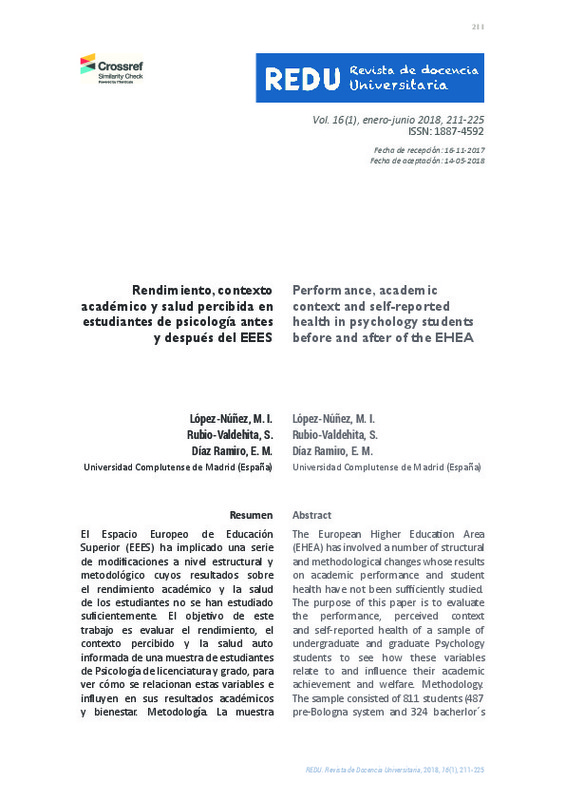|
Resumen:
|
[EN] The European Higher Education Area (EHEA) has involved a number of structural and methodological changes whose results on academic performance and student health have not been sufficiently studied. The ...[+]
[EN] The European Higher Education Area (EHEA) has involved a number of structural and methodological changes whose results on academic performance and student health have not been sufficiently studied. The purpose of this paper is to evaluate the performance, perceived context and self-reported health of a sample of undergraduate and graduate Psychology students to see how these variables relate to and influence their academic achievement and welfare. Methodology. The sample consisted of 811 students (487 pre-Bologna system and 324 bacherlor ́s degree). For the evaluation of the indicated variables, the following instruments were used: the Academic Context questionnaire, to evaluate the educational environment; the GHQ-28 questionnaire to evaluate the self-reported health; and the CHAS (Cuestionario de Hábitos de Sueño, in Spanish, Sleeping Habits Questionnaire), in addition, the academic performance was collected. Results. EHEA students perform better than students pre-Bologna, although the difference is not very high. They are also more dissatisfied with the results obtained, they have worse psychological health, worse quality of sleep, greater anxiety and insomnia, greater social dysfunction, in addition, they need more medical leave due to stress and anxiety. Conclusions. Adaptation to the EHEA does not seem to achieve its objectives of improving the quality of education and having a negative impact on the health and physical and psychological well-being of students.
[-]
[ES] El Espacio Europeo de Educación Superior (EEES) ha implicado una serie de modificaciones a nivel estructural y metodológico cuyos resultados sobre el rendimiento académico y la salud de los ...[+]
[ES] El Espacio Europeo de Educación Superior (EEES) ha implicado una serie de modificaciones a nivel estructural y metodológico cuyos resultados sobre el rendimiento académico y la salud de los estudiantes no se han estudiado suficientemente. El objetivo de este trabajo es evaluar el rendimiento, el contexto percibido y la salud auto informada de una muestra de estudiantes de Psicología de licenciatura y grado, para ver cómo se relacionan estas variables e influyen en sus resultados académicos y bienestar. Metodología. La muestra estuvo compuesta por 811 estudiantes (487 de licenciatura y 324 de grado). Para la evaluación de las variables indicadas se utilizaron los siguientes instrumentos: cuestionario de Contexto Académico, el cuestionario GHQ-28 para evaluar la salud percibida, y el Cuestionario de hábitos de sueño CHAS, además se recabó el rendimiento académico. Resultados. Los estudiantes del EEES obtienen un mejor rendimiento que los de licenciatura, aunque la diferencia no es muy elevada. Así mismo muestran estar más insatisfechos con los resultados obtenidos, tienen peor salud psicológica, peor calidad de sueño, mayor ansiedad e insomnio, mayor disfunción social y más bajas médicas por estrés y ansiedad. Conclusiones. La adaptación al EEES parece que no cumple con sus objetivos de mejora de la calidad de la enseñanza además de tener un impacto negativo en la salud y bienestar físico y psicológico de los estudiantes.
[-]
|








